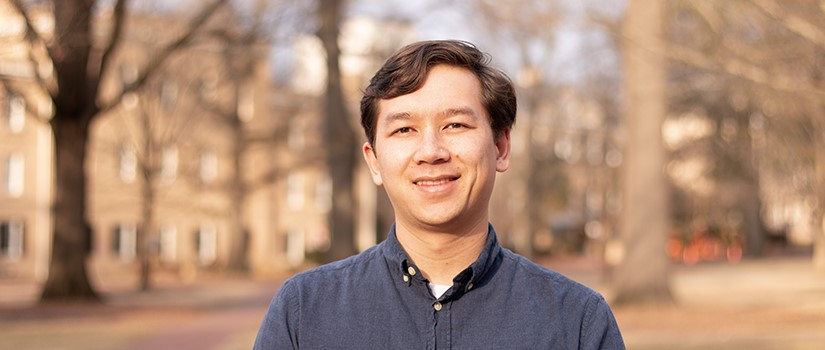When Ethan Older thinks of bacteria, he envisions tiny chemists at work inside us.
Older, a fifth-year doctoral student in the college’s Department of Chemistry and Biochemistry, researches the bacteria that live in the human digestive tract, known as the gut microbiome.
While some bacteria can be harmful, many work with the human body to keep everything from digestion to the immune system running smoothly by creating enzymes and molecular compounds that are important to human health.
“The bacteria in the human gut have evolved ways to hijack their host’s cellular pathways and use their environment for their own benefit,” Older says. “At the same time, these organisms don’t hurt the human host and may even benefit them.”
An everyday example of this is the probiotics in foods like yogurt, which help these bacterial ecosystems to thrive, resulting in a better balance of enzymatic activity in the digestive tract. The gut microbiome also plays a role in creating molecules used in the body’s immune response, making it crucial to human health.
Bacteria can create complex molecules in ways we don’t understand yet. This holds great promise for discovering natural products that may have medical applications.
– Ethan Older, doctoral candidate in chemistry and biochemistry
Older’s research aims to expand scientific knowledge of these microbial chemists by studying their genes and finding out how they work. He uses data from the Human Microbiome Project, a database of the DNA of bacteria present in and on humans.
Older identifies specific genes linked to functions of the gut, essentially “mining” genes for a more complete understanding of the gut microbiome.
“We use the database to look for patterns in the DNA that correspond to genes that we know are associated with the natural synthesis of certain molecular compounds,” Older says.
The goal is for scientists to be able to replicate this synthesis in the lab by culturing bacteria and seeing if the resulting compound is what they expect.
One surprising finding, Older says, is that often microbes create molecules with fewer steps by far than a scientist would need to make the same substance.
“Certain bacteria can create complex molecules in ways we don’t understand yet,” Older says. “This holds great promise for discovering natural products that may have medical applications.”
In the long run, mining the genes of these bacteria may lead to better treatments for common afflictions like inflammatory bowel disease, or IBD. While scientists believe IBD results from an overactive immune response in the gut, Older says they don’t yet know why it’s so prevalent.
Through his research on the genetic link to these symptoms, Older will lay the groundwork for scientists to more fully understand the causes of this disease and others.
“We’re trying to connect, from a molecular standpoint, how certain bacteria cause disease so that we can potentially try to target that function and manipulate those bacteria to develop new treatments,” Older says.
A decade of collaboration
The microbiome data had just been published when Older started this research ten years ago. At that time, he was an undergraduate at the University of California San Diego, where a post-doctoral student was mentoring him.
“My mentor and I started imagining what could be possible with all this data available,” he says. “It definitely sparked my interest in this field.”
That mentor happens to be Professor Jie Li, who now teaches in USC’s Department of Chemistry and Biochemistry and serves as Older’s advisor on his dissertation. Older came to USC to work with Li because the field of microbe gene mining was new, and he knew USC would offer a supportive environment to explore this area.
Li says the partnership with Older has been exceptionally strong because they complement each other’s research abilities, with Older bringing his skills in computer coding and programming to the database work.
“It is not common to see collaborations like this one, starting from Ethan being an undergraduate researcher working with me in San Diego, then setting up our lab together at South Carolina, and now still maintaining a very active and supportive partnership,” Li says.
“Ethan has made significant contributions to our research field and has grown to become a strong independent researcher and scholar with tremendous potential.”
Older’s research has earned him recognition as a 2023 Graduate Breakthrough Scholar, among other awards for his work with Li. After finishing his doctoral research, he hopes to continue his contributions to the field through further academic scholarship and put his expertise to work in industry applications.
